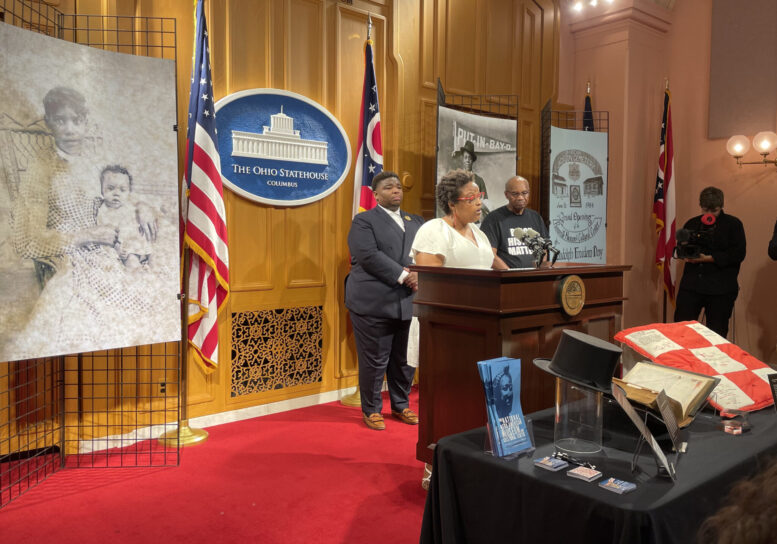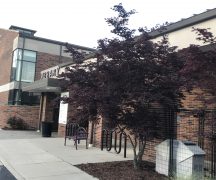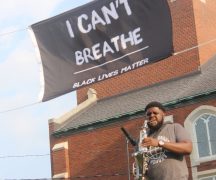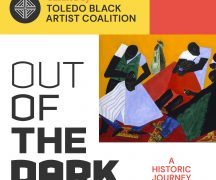BY NICK EVANS
On the eve of Juneteenth Tuesday, Ohio state Rep. Dontavius Jarrells, D-Columbus, announced plans for a resolution acknowledging the story of the Randolph Freedpeople. It’s a dark but largely forgotten incident in Ohio’s history, and Jarrells hopes his effort can be the first step toward restitution.
In 1846, a group of nearly 400 recently freed Black people were halted by a white mob in New Bremen. When the Randolph Freedpeople were freed, their former owner’s will set aside money to buy them land. His executor settled on Mercer County because there was a thriving Black settlement there called Carthagena. But white residents recoiled from the prospect of hundreds of new Black neighbors.
When the Freedpeople stepped off canal boats in New Bremen, they were headed for land that belonged to them. The white mob simply refused to let them go there and forced them out of the county.
“You know, tomorrow we’ll celebrate Juneteenth,” Jarrells said, “and the fight for freedom is still happening.”
[RELATED: A white mob in Ohio denied land to hundreds of former slaves, a lawmaker wants to right that wrong]
Shining a light
After getting turned away, the Randolph Freedpeople dispersed across neighboring counties, and they did their best to keep their story alive. People like Helen and Issac Gilmore set up a small museum in Rossville — the settlement just outside Piqua city limits where some of the Freedpeople landed. After they passed those artifacts made their way to the National Afro-American Museum & Cultural Center in Wilberforce.
Curator Hadley Drodge brought photos, a top hat, a handmade quilt and a family bible from the collection. She described it as “just a small cross section of the historical evidence of this story.”
Pointing to the bible, she explained, “This was owned by Rosa Coles and given to her on Christmas Day by her mother, and it contained two locks of hair which to me was so profound, because again, here is material evidence of this history.”

Jarrells spoke to reporters Tuesday flanked by those photos and artifacts — physical reminders of how hard descendants of the Randolph Freedpeople worked to preserve their history. Despite those efforts, Jarrells said, the Randolph Freedpeople’s story is almost completely unknown
“The first thing that most of my colleagues have said to me has been, ‘Wow, this happened? This happened in Ohio? I didn’t even know,” Jarrells said.
“And I didn’t know, to be quite frank with you,” he added.
That lack of awareness frustrates him even more in light of the descendants’ ongoing efforts to catch the ear of people in state government.
In the early 1990s, Paisha Thomas recalled how her grandmother and several other descendants got together on her birthday and wrote letters to state leaders. “George Voinovich was the governor at the time,” she said, noting they also wrote to several Ohio lawmakers as well as the governor of Virginia.
“And what came back to them was, we’re sorry to hear about this,” Thomas said, and she recalled bitterly that one lawmaker’s response referred to “land that you claim belonged to your ancestors.”
“But largely the response was, we suggest that you seek legal representation and that was as far as it went,” she said.
What does that something look like?
Jarrells argues that atoning for what happened in 1846 starts with acknowledging it.
“The first part is awareness,” he said, “Making sure that our state recognizes that this happened, and we should do something.”
“And then the second step,” he continued, “is figuring out what would that something look like?”
While that open-ended assignment leaves room for a lot of possibilities it’s also where the job gets difficult. Among Jarrells’ ideas are a museum or a scholarship fund for descendants. Likely a bigger political lift, Jarrells suggested lawmakers consider giving descendants state-owned land in area.
Local historian Larry Hamilton emphasized the importance amplifying the Randolph Freedpeoples’ story. A former history teacher with 30-years of classroom experience, he showed up in a shirt that read “Black history matters.”
“I didn’t wear this for nothing,” he joked.
Hamilton argued, “One of the things that I have long promoted is the idea of valuing and honoring the struggle for freedom, especially in connection with the Randolph Freedpeople.”
“There were people who struggled and deserve to be recognized with ownership identity,” he continued. “By way of public properties, that’s a small way that we can have some level of reparative justice.”
Regardless of potential challenges or what form the response takes, Jarrells’ struck an optimistic tone.
“I’ve been talking with the Governor’s team, I’m talking with our Republican colleagues,” he said. “No one I have talked to said to me, this is something that we should not be talking about.”
Also from Ohio Capital Journal:
Juneteenth offers new ways to teach about slavery, Black perseverance & American history
Students often tell me that they’re not learning much about slavery beyond the suffering and harsh conditions that it involved. As a historian who specializes in how slavery is taught in K-12 classrooms, I believe there are several ways educators can incorporate Juneteenth into their instruction that will give students a broader understanding of how Black people resisted slavery and persevered in spite of it.
— Raphael E. Rogers





